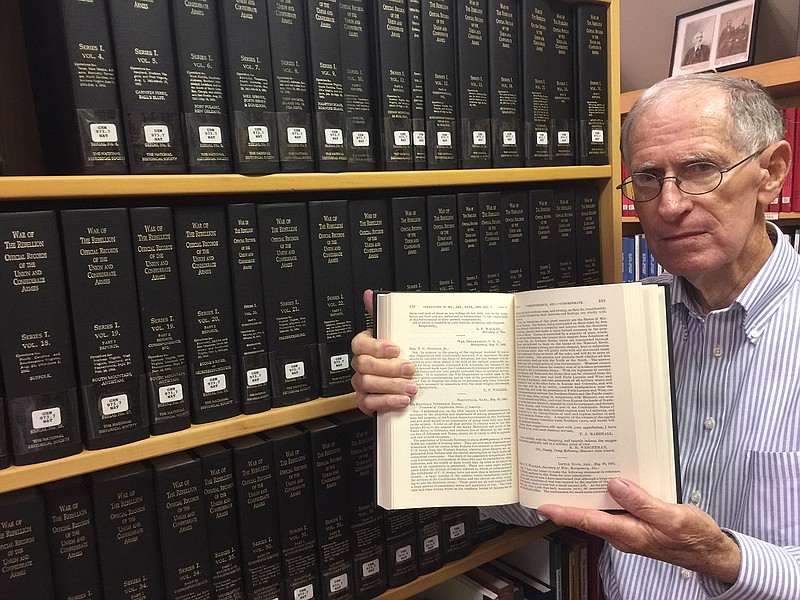Even longtime historian Charles Steger of Atlanta, Texas, is impressed by one holding at the Atlanta Public Library.
A collection of 47 black and heavy volumes on the second floor shelves of the genealogical society are filled with "The War of the Rebellion: A Compilation of the Official Records of the Union and Confederate Armies."
"All the communications of the officers during the Civil War are here. It's fascinating. You go back and read exactly what was said. These are used all the time by people searching for family history proof that someone was or was not there," Steger said.
The series actually extends to 128 volumes.
Here's an example from the opening page. It's Dec. 26, 1860. Maj. Robert Anderson, commander, First Artillery, is at Fort Moultrie in Charleston Harbor, S.C., with just a few men. He is saying he's abandoning. He can't defend this fort. He's moved everything to Fort Sumter.
"The step which I have taken was, in my opinion, necessary to prevent the effusion of blood," he tells his commander.
The next day, U. S. Secretary of War J. B. Floyd, responds.
"Intelligence has reached here that you have abandoned Ft. Moultrie, spiked your guns, burned the carriages, and gone to Ft. Sumter. It is not believed, because there is no order for any such movement. Explain the meaning of this report."
By return telegram, Anderson replies:
"The telegram is correct. I abandoned Ft. Moultrie because I was certain if attacked my men must have been sacrificed and the command of the harbor lost (this) garrison never would have surrendered without a fight."
In January, as conflicts continue, F. C. Humphreys, an arsenal commander, is surrounded by Confederate forces and has no way to defend the arsenal. He writes to the Confederates, "I also demand as a right that I be allowed to salute my flag before lowering it, with one gun for each State now in the Union."
Humphreys is granted that right, abandons and takes the flag with him.
Then, on April 12, Commander Anderson at Sumter tells the Confederate commander Brig. Gen. Beauregard, he will leave Sumter by noon on this day, if provided with necessary means of transportation.
In return, aides for Gen. Beauregard reply, "We have the honor to notify you that he will open the fire of his batteries on Fort Sumter in one hour from this time."
The Civil War began in an hour.
Such immediate impact is a major importance for a holding such as this, Steger emphasizes.
The volumes are frequently used," librarian Jackie Icenhower said.
"In 2014, we had a re-organization here of the United Daughters of the Confederacy. The UDC had been started back in 1901 by Gertrude Curtwright in Linden in behalf of her Civil War veteran husband Cornelius. She was instrumental in gathering the money for the Civil War monument on the square in Linden."
Icenhower said today's UDC makes use of these volumes.
"You have to prove your lineage to be a member of the UDC. We've needed more on the Civil War. We have a large selection of the Revolutionary War thanks to the Daughters of the American Revolution group we have here," she said.
Atlanta's volumes of The War the the Rebellion are to be picked up and read. One looks in the index for names or battles. They are not digitized on the genealogical society's local website.
"You choose the state where the battles occurred and research those volumes," Steger said. "They are important to anyone doing military research on both Union and Confederate sides. The amazing thing is that we have such communication of both sides preserved."
Steger noted that perhaps the volumes may not be so useful for the usual genealogical research.
"Some time they do mention the common soldier, but I'm not certain if these names are indexed."
The project was authorized by an Act of Congress June 16, 1880. All reports, letters, telegrams and general orders of military orders were to be gathered, arranged and published. Four series were produced, and about 10,000 copies printed. Atlanta's library has the first of the four series contained in the complete 125 volumes.

